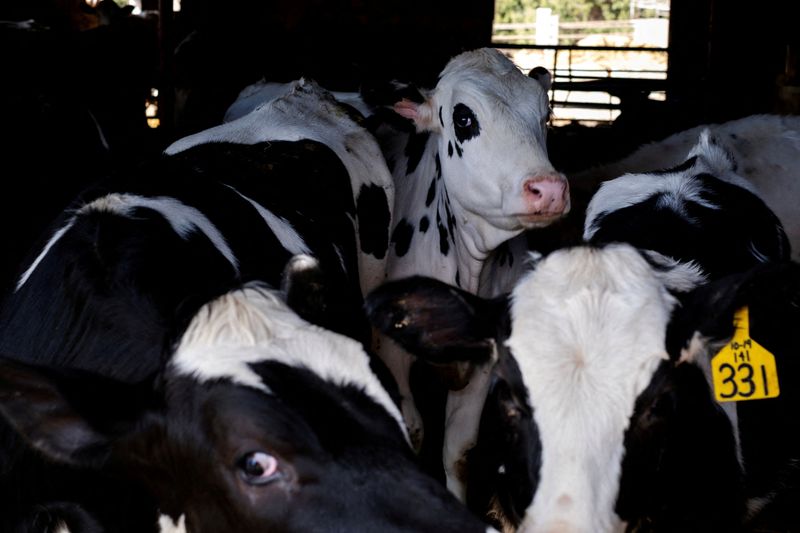By Tom Polansek and Julie Steenhuysen
CHICAGO (Reuters) -The U.S. government will require dairy cattle moving between states to be tested for bird flu starting on Monday as federal officials ramp up their response to an outbreak that has bled over into the U.S. milk supply.
Agriculture Secretary Tom Vilsack on Wednesday said all laboratories and state veterinarians in the country must report positive tests, and the U.S. Department of Agriculture (USDA) would pay for increased testing.
The measures aim to contain the spread of bird flu, which has been reported in eight states and 33 dairy herds since it was first detected in late March in Texas. A person exposed to cattle tested positive for the disease and suffered conjunctivitis.
Dr. Michael Worobey, an evolutionary biologist at the University of Arizona, said based on new information, it appears that infections with the H5N1 virus in dairy cattle occurred through a single transmission event from a bird to a cow sometime in late 2023, likely in December.
Worobey and colleagues analyzed genetic sequences of the virus released by the USDA over the weekend.
The U.S. Food and Drug Administration reported on Tuesday that it found bird flu virus particles in some pasteurized milk samples, but said it remains safe for human consumption as such milk has been heated to a high temperature to kill harmful bacteria and viruses.
Vilsack said the U.S. milk supply is safe "based on the information we currently have available," adding that no live virus has been found.
Milk containing bird flu particles entered the commercial supply from asymptomatic cows that were found to be infected through testing, he said.
USDA has carried out more than 2,000 tests on cattle samples over the last several weeks, Vilsack said.
Dairy cows must test negative for influenza A virus, which includes bird flu, at an approved laboratory before being shipped across state lines, the USDA said. Owners of cows that test positive will be required to provide epidemiological information, including animal movement tracing, the department said.
The agency plans to initially focus testing on lactating cows.
SPREAD BETWEEN COWS
Richard Webby, director of the World Health Organization's Collaborating Center for Studies on the Ecology of Influenza in Animals and Birds at St. Jude's Children's Research Hospital in Memphis, said testing cows about to be transported will help.
"If we can control the virus moving with those cows, then absolutely we're going to be better off," Webby said.
Positive flu tests will prohibit cows from being moved for 30 days and until they test negative, Vilsack added. Dairy cattle appear to recover from bird flu, a disease often lethal to chickens and turkeys.
"Over the last several weeks, USDA has noted spread between cows within the same herd; spread from cows to poultry; spread between dairies associated with cattle movements; and cows without clinical signs that have tested positive," Vilsack said.
USDA estimates it will need about $500 million to continue to address outbreaks in dairy cows, commercial poultry flocks, wild birds and potentially other species.
It is finalizing a request to transfer money from the Commodity Credit Corporation, which provides funds from the U.S. Treasury to help stabilize agricultural prices and support farm income.
The Meat Institute, which represents U.S. meat processors, urged USDA and the U.S. Centers for Disease Control and Prevention (CDC) to conduct additional testing to ensure beef remains safe to eat and to protect meatpacking workers from infection. USDA said it is confident the meat supply is safe.
The CDC maintained its low risk assessment for the general public after USDA microbiologists on April 16 "identified a shift in an H5N1 sample from a cow in Kansas that could indicate that the virus has an adaptation to mammals," the USDA said.

The finding had been seen previously in other mammals and does not impact viral transmission, according to the department.
The USDA in a statement said it "has not found changes to the virus that would make it more transmissible to humans and between people."